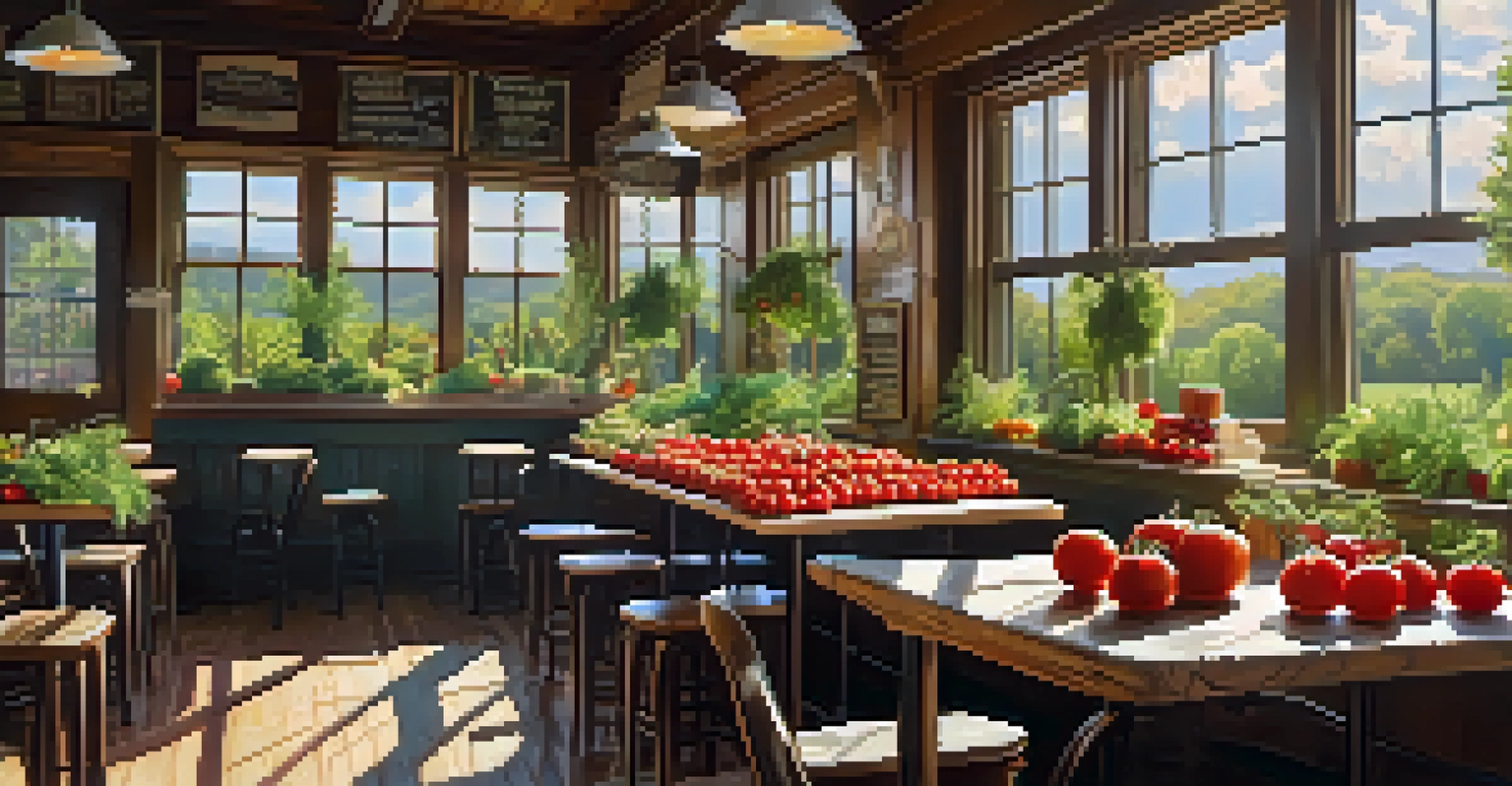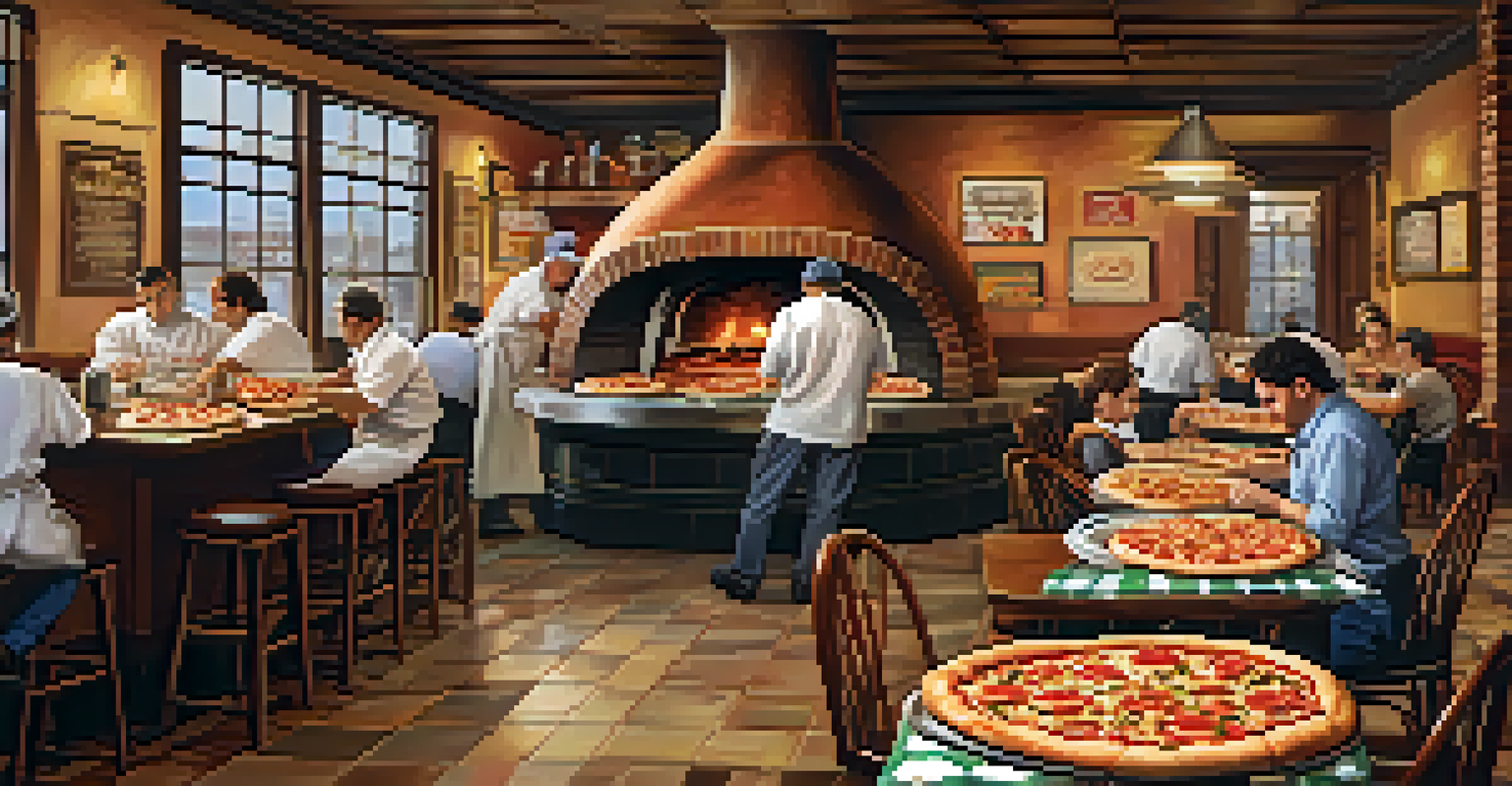The Influence of New Jersey's Diverse Cultures on Cuisine

The Melting Pot: New Jersey's Cultural Tapestry
New Jersey is often referred to as a melting pot, and for good reason. With waves of immigrants from various backgrounds, the state showcases a vibrant mix of cultures. This diversity has not only influenced the social fabric but also the culinary landscape, making it a unique place for food lovers.
Food is a central activity of mankind and one of the single most significant trademarks of a culture.
From Italian and Irish to Indian and Hispanic communities, each group has brought its own flavors and cooking techniques. These influences can be seen in the local restaurants and markets across the state. For instance, you can find everything from classic pizza to spicy tacos, all within a few blocks.
This rich variety means that every meal is an opportunity to experience a different culture. Dishes often reflect the history and traditions of their origins, making New Jersey's cuisine a true representation of its people.
Italian Influence: A Slice of New Jersey's Heart
Italian immigrants have left an indelible mark on New Jersey's culinary scene. Towns like Hoboken and Newark are famous for their authentic pizzerias and bakeries. Whether it's a cheesy slice of pizza or a fresh cannoli, these treats have become staples in the local diet.

Beyond just pizza, Italian cuisine in New Jersey spans a wide range of dishes. You can enjoy hearty pasta dishes, flavorful sauces, and delightful seafood, all prepared with traditional recipes handed down through generations. This cuisine often evokes a sense of nostalgia among locals.
New Jersey's Cultural Diversity
New Jersey's rich tapestry of cultures influences both its social fabric and culinary landscape, offering a unique dining experience.
Moreover, the Italian influence is not limited to restaurants. Many families in New Jersey prepare these beloved dishes at home, creating a strong connection between food, culture, and community. This familial aspect of dining enhances the overall experience of Italian cuisine in the state.
The Latin Flavor: Hispanic Contributions to Cuisine
Hispanic cultures have significantly enriched New Jersey's food scene, introducing vibrant flavors and dishes. Restaurants offering Mexican, Puerto Rican, and Dominican food are prevalent, each showcasing their unique culinary traditions. Tacos, empanadas, and mofongo are just a few examples of the tasty offerings available.
The culture of food is a way to understand the culture of a people.
Street food markets and festivals celebrate this diversity, allowing locals to sample various dishes in one place. These events foster a sense of community, where people gather to enjoy food, music, and dance. The lively atmosphere is contagious and speaks to the heart of Hispanic culture.
Additionally, many local grocery stores feature ingredients specific to Hispanic cooking, making it easier for families to recreate traditional recipes at home. This accessibility ensures that the cultural heritage continues to thrive in New Jersey.
Asian Influence: A Taste of the East in New Jersey
Asian cuisine has also made a significant impact on New Jersey's food culture, with a variety of restaurants serving everything from sushi to dim sum. With communities from China, India, Japan, and Vietnam, the flavors and cooking techniques are as diverse as the people themselves. This blend creates a delicious culinary landscape for adventurous eaters.
Dining options range from upscale sushi bars to casual noodle shops, catering to all tastes and budgets. Food lovers can explore spicy curries, fresh spring rolls, and aromatic pho, each dish telling a story about its origins. The accessibility of these cuisines has made them a part of daily life for many New Jerseyans.
Fusion Cuisine Innovation
The state's culinary scene thrives on fusion cuisine, where diverse cultural influences create exciting and innovative dishes.
Moreover, Asian grocery stores abound, offering ingredients that allow home cooks to experiment with these vibrant flavors. This not only promotes cultural appreciation but also encourages culinary creativity among residents.
The Influence of African American Cuisine
African American cuisine plays a vital role in shaping New Jersey's culinary identity. Rooted in history and tradition, dishes like soul food highlight the cultural significance of food within the community. Staples such as fried chicken, collard greens, and cornbread reflect a rich heritage.
Local restaurants often celebrate this cuisine, providing a space for people to gather and share in the experience. Festivals dedicated to African American culture frequently feature food as a central element, showcasing the depth and diversity of these culinary traditions. These events foster unity and pride within the community.
Additionally, many African American families continue to pass down recipes, preserving their culinary heritage. This intergenerational sharing of food not only keeps traditions alive but also strengthens family bonds.
Fusion Cuisine: Where Cultures Collide
One of the most exciting aspects of New Jersey's culinary scene is fusion cuisine, where different cultural influences combine to create something unique. Chefs are increasingly experimenting with flavors and techniques from various backgrounds, resulting in innovative dishes. For example, you might find Korean tacos or Italian-Jamaican fusion, each offering a new taste experience.
This creativity reflects the diverse population of New Jersey, where cultural exchange is a daily occurrence. Restaurants dedicated to fusion cuisine are often at the forefront of culinary trends, attracting foodies eager to try something new. The blending of flavors creates an exciting dining experience that keeps patrons coming back.
Local Ingredients Matter
The farm-to-table movement in New Jersey emphasizes the use of local ingredients, enhancing flavor and supporting local economies.
Moreover, these fusion dishes often tell a story of collaboration and respect between cultures, highlighting the beauty of diversity in food. This trend not only enhances the variety of options available but also fosters a deeper appreciation for the culinary arts.
Local Ingredients: A Farm-to-Table Revolution
The farm-to-table movement has gained momentum in New Jersey, emphasizing the importance of using local ingredients in cooking. With a rich agricultural landscape, the state produces a variety of fruits, vegetables, and meats that enhance the quality of dishes. Restaurants are increasingly sourcing their ingredients from nearby farms, ensuring freshness and supporting local economies.
This focus on local produce allows chefs to create seasonal menus that highlight the best of what New Jersey has to offer. Diners can enjoy dishes made with ingredients picked at their peak, resulting in richer flavors and better nutrition. Such practices not only promote sustainability but also connect diners to the land.

Additionally, farmers' markets have become popular gathering spots for communities, where locals can purchase fresh produce and learn about sustainable practices. This relationship between consumers and producers fosters a deeper understanding of the food system and encourages a culture of appreciation for local cuisine.
Culinary Festivals: Celebrating New Jersey's Diversity
New Jersey hosts a variety of culinary festivals that celebrate its diverse cultures and cuisines. These events provide a platform for local chefs, restaurants, and food vendors to showcase their culinary talents. From Italian feasts to multicultural food festivals, there's something for everyone to enjoy.
These festivals not only highlight the rich flavors of New Jersey but also promote cultural exchange and understanding. Attendees can sample dishes from different regions and learn about the traditions behind them. It’s a fantastic way to bring communities together and celebrate the state’s diversity through food.
Moreover, culinary festivals often feature live music, cooking demonstrations, and workshops, making them a fun outing for families and friends. By immersing themselves in the food and culture, attendees leave with a greater appreciation for the culinary landscape of New Jersey.